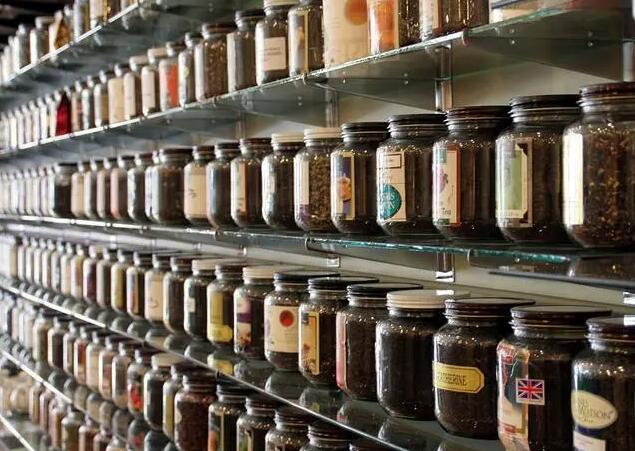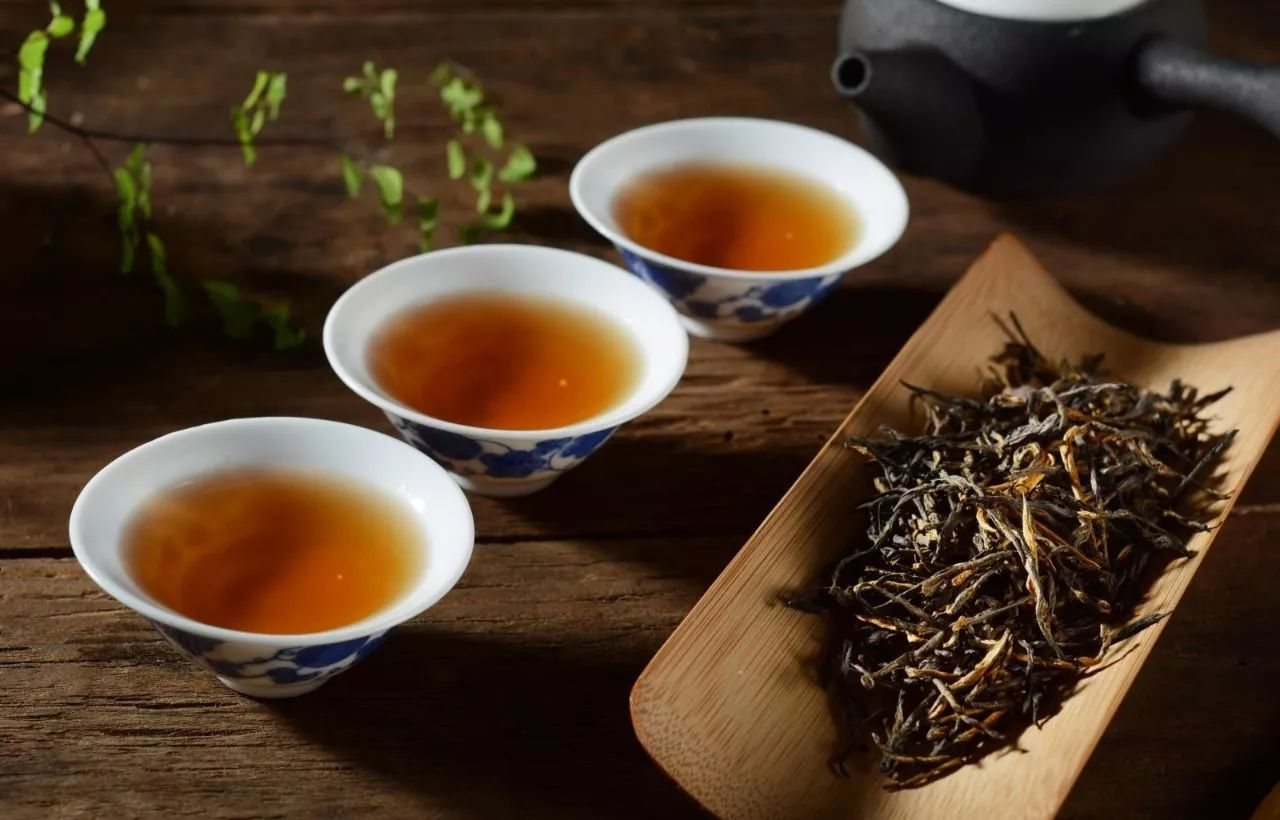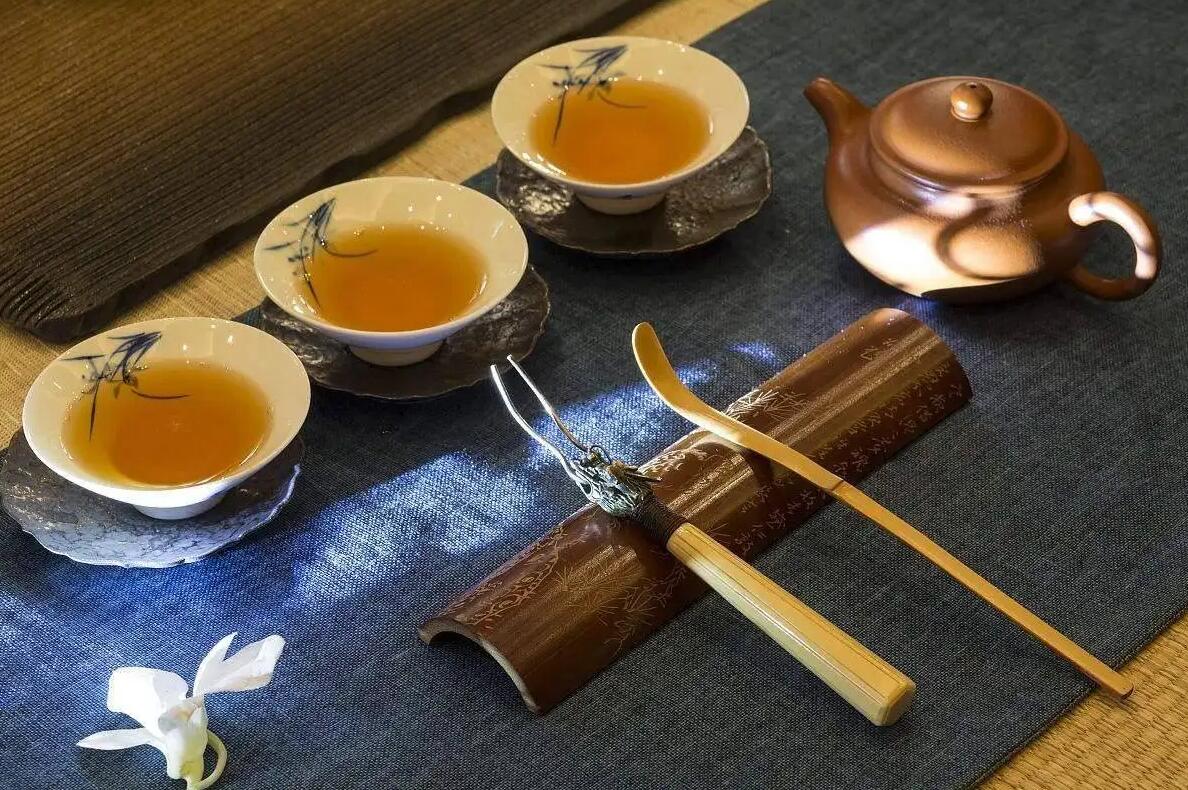It is not only possible to cultivate our aesthetic senses through Cha Dao, we can also enhance our character, our personality and form a more balanced view of ourselves and our true nature by understanding the spirit of Cha Dao. Over its history of several thousand years, Chinese Cha Dao has accumulated the best of Chilians ancient and modem knowledge. The spirit of Chinese Cha Dao can be summarized into four words: 'perseverance'(守), 'sincerity'(真), 'benefit' (益), and 'harmony'(和). These four words provide guidance for learning about Cha Dao, and as the purpose of Cha Dao is to lead us to understanding life, then comprehending the true meaning of these words is also to comprehend life.
Perseverance: This idea is uniquely put forward in Chinese Cha Dao and means to stick to your duty and keep a natural and simple personality.
Sincerity: This is the foundation of Chinese Cha Dao and reminds us to keep a pure and genuine character, and to always give the task at hand our fiill respect and attention.
Benefit: The core spirit of Chinese Cha Dao - our actions should bring benefit, or value, to our self and to others.
Harmony: Also at the heart of Chinese Cha Dao is the idea that we should always seek harmony within ourselves, within our society and our environment-moderation and balance in tea and life.
The Meaning of Perseverance (守)
In Mandarin Chinese,the character 守 (shou) can be interpreted as perseverance. But over the years shou has had many connotations and meanings. In ancient times, it denoted an official position; similar to the word 'guard' in English. Shou can also be used to say someone has a conservative attitude, meaning the person would be pragmatic and make concessions and thereby passively escape from the troubles of life. In this sense? some Chinese people consider shou a negative word. But in the context of Chinese Cha Dao, shou means a steady, stable mind, not easily raffled by exterior events; temptations or changes - a virtue of perseverance and tenacity in pursuing a belief, truth or morality.
For example, Lao Tzu mentioned shou in explaining the three methods for understanding the cosmic origin in the Too Te Ching:
'He who is aware of the Male, but keeps to the Female, becomes the ravine of the world…He who is conscious of the white (bright), but keeps to the black (dark), becomes the model for the world…He who is familiar with honor and glory, but keeps to obscurity, becomes the valley of the world.'
From this perspective, those who are aware of shou, capable of shou and good at shou are the wise ones, because they possess the moralities of modesty, tolerance and perseverance - the keys to successful living.
Perseverance, the English translation of shou, does not offer a complete understanding. In fact English is lacking an exact translation, but perseverance with positive connotations; commitment or dedication, provides a closer understanding. Mandarin is an ancient language steeped in meaning where each character can be as a picture telling many stories and parables, and as such there are several more aspects to the meaning of shou in Cha Dao.
Firstly, perseverance is the persistent pursuit of what is good, genuine and beautiful in all aspects of life' such as the tea ceremony. An old Chinese saying goes: 'Perseverance in personal benefits won't last long, but perseverance in love will last as long as one lives.' For the Chinese tea enthusiasts, this saying is particularly true, as tea stands for something good, genuine and beautiful rather than something evil, fake and ugly. Tea becomes a part of their life which is worth persevering for, their love and affection for tea motivates them to keep striving for the essence in both life and tea. Despite life's ups and downs, the temptations and troubles of the outside world, they will always find an earthly haven, a peaceful atmosphere created by tea.
Secondly, the Chinese people place an emphasis on perseverance in many aspects of their lives; they believe a nation is founded on perseverance, a relationship is held together by perseverance, and a moral attainment is based on perseverance. Perseverance is regarded as a must for cultivated gentlemen, and it is regarded as a quality pursued by people down through the ages.
As a keystone of traditional Chinese culture, Chinese Cha Dao is among the many things that reflect the emphasis on perseverance. Chinese Cha Dao requires a tea master to spend time on boiling the water, brewing the tea, practicing the tea ceremony and learning Cha Dao. It takes time and effort to truly taste a cup of tea, to enjoy the leisurely atmosphere and to find inner peace through tea, That's why we say perseverance can guide you to understanding Cha Dao; it is a spirit one needs to pursue to grasp the wisdom in Cha Dao.
Moreover, perseverance means to stick to your aims and goals, and never give up until you achieve them, Chinese people also like to combine perseverance with honesty and diligence, these words show the virtue of always keeping promises, taking responsibility, duteously doing one's own part, and resisting temptation. Chinese Cha Dao nurtures us to pursue and carry out the virtue of perseverance in our daily life so that we can calmly face any success or failure.
The Meaning of Sincerity (真)
In Mandarin Chinese, 真(zhen) can be interpreted as sincerity. There are several phrases in Chinese that reflect the profound meaning of zhen, such as zhenli (truth),zhenzhi (genuine knowledge), or zhenai (truelove). These phrases show that in interpersonal communications, the Chinese people value sincere words, wholehearted support, honest behavior, real characteristics and emotions. Like Chuang Tse wrote in his Chuang Tse: Fisherman:
'A man's proper Truth is pure sincerity in its highest degree - without this pure sincerity one cannot move others. True grief, without a sound, is yet sorrowful; true anger, without any demonstration,yet awakens awe; true affection, without a smile, yet produces a harmonious reciprocation. Given this truth within, it exercises a spiritual efficacy without, and this is why we count it so valuable. '
Chinese Cha Dao also values sincerity, it puts forward that the truth in tea drinking is to feel the purity of tea so that one can understand the pure and simple character inherent in man. To sense the naturalness of tea so that one can realize the nature of man, and to experience the authenticity and sincerity conveyed by tea so that one can understand the importance of being sincere and truthful in life.
In China, we stress sincerity in various tea related activities; when producing and processing tea,we should stick to the scientific approach and the right process of de-enzyming, rolling, blending,fermenting, pressing and packaging tea to present people with good quality tea. When brewing tea,we should choose suitable teaware made from real wood, bamboo, pottery or porcelain to give full play to the true aroma and flavor of the tea. When serving tea we should be sincere and respectful to the guests. And when appreciating tea, it is preferable to be in an environment with mountains and water, with genuine calligrapher and paintings of the known masters. In short, every detail in tea-related activities should be attended to to as to be sincere. Whan we are able to fully comprehend and fulfill the spirit of sincerity, we have one foot on the threshold of Cha Dao.
The Meaning of Benefit (益)
益(yi) or benefit, is one of the most important notions in Chinese Cha Dao. We often say, 'Tea, as the national drink, benefits our body and mind' We believe there are five major benefits of tea;
- As a drink, tea supplies our bodies with water to meet our physiological needs.
- Drinking tea relaxes our body and calms our mind.
- By appreciating tea, one can experience the quiet and peaceful atmosphere created by tea.
- The tea ceremony provides one with artistic enjoyment.
- Through tea one can be inspired to understand the Tao in tea and pursue the spirit of Cha Dao.
The benefits in Yixing tea set it apart from other social habits such as cigarettes and alcohol. Smoking is harmful to healthy too much alcohol is damaging to our body, only tea entirely benefits our body and mind.
In the tea ceremony, benefit represents a spirit of shadings which means our behavior should not only benefit ourselves but also benefit others. A selfish person only thinks of himself, he doesn't know how to share things with others, so his actions may only benefit While a broadminded or selfless person not .only thinks of himself, but also shares things with others; when he benefits from somethings he is willing to spread that benefit to others. Such a spirit of sharing is also embodied in Chinese Cha Dao; the tea master performs a tea ceremony not just to brew tea, but also to share the artistic beauty of the ceremony with the guests. He serves tea and shares it with his guests; they share the same atmosphere to appreciate tea, to talk and exchange ideas and their feelings about the flavor of the tea with the tea master.
Furthermore, benefit enhances our pursuit of self-cultivation, and it stimulates us to engage in public welfare, to do good and help the poor, to be thoughtful and love others, and to perform charity in a timely and graceful manner. In the process of spreading benefit to others, our minds are cultivated, and this in turn will bring us to a higher level of understanding Cha Dao.
The Meaning of Harmony (和)
和(he) or harmony is a philosophical idea shared by Confucianism,Buddhism, and Taoism,it is also the core of Chinese Cha Dao. The concept of harmony originates from the notion; 'great harmony is preserved in union, from the I Ching which suggests that everything in die world is composed of two elements: Yin and Yang, Yin and Yang are closely coordinated with each other, so that the energy of harmony is preserved. Only when the universe is filled with the energy of harmony can it benefit all things in the universe. In The Classic of Tea, Lu Yu mentioned that harmony and balance can only be achieved through the mutual promotion and restraint between the Five Elements.
The concept of harmony proposed in Chinese Gha Dao is based on the ideas of Confucianism,Buddhism, and Taoism; to administer a nation with Confucian ideas, to control and develop one's mind with Buddhist ideas, and to cultivate oneself with Taoist ideas. With the connotation of balance, moderation, gentleness, modesty, and mildness behind it, harmony should be established between external behavior and internal thought, and harmony should also be maintained in our relationships and with our environment. Tea related activities lead us to enjoy the beauty of Cha Dao, to enhance self-cultivation and to understand the importance of harmony and make an effort to realize harmony in our own lives. The connection between Chinese Cha Dao and Confucianism, Buddhism, and Taoism in regard to their mutual emphasis on the concept of harmony is worth noting:
'The doctrine of the mean' requires us to have an unbiased, impartial and moderate view on all things in the world, benevolence and courtesy' guides us to have gentle and polite manners, to get to know others, understand the thoughts of others and examine ourselves when we communicate with others and handle interpersonal relationship. Tea serves as a medium for us to communicate and strengthen friendship, and to see others and ourselves through clear eyes.
Both Confucianism and Chinese Cha Dao hold the notion of 'harmony without uniformity', which indicates that we should recognize both similarities and differences among things in the world. Harmony can be established when different things co-exist and coordinate, promote and supplement each other. 'Harmony without uniformity, shows a broad mind and a spirit of inclusiveness, which a tea master should possess to better understand the concept of Cha Dao.
In shorty harmony advocated in Chinese Cha Dao embodies our pursuit of a harmonious and beautiful world where man and nature, man and society, coordinate and coexist with each other.
To conclude, the four elements 'perseverance', sincerity', 'benefit' and 'harmony' are closely connected with each other and together constitute the wisdom in Cha Dao which offers guidance to balanced and successful living.



